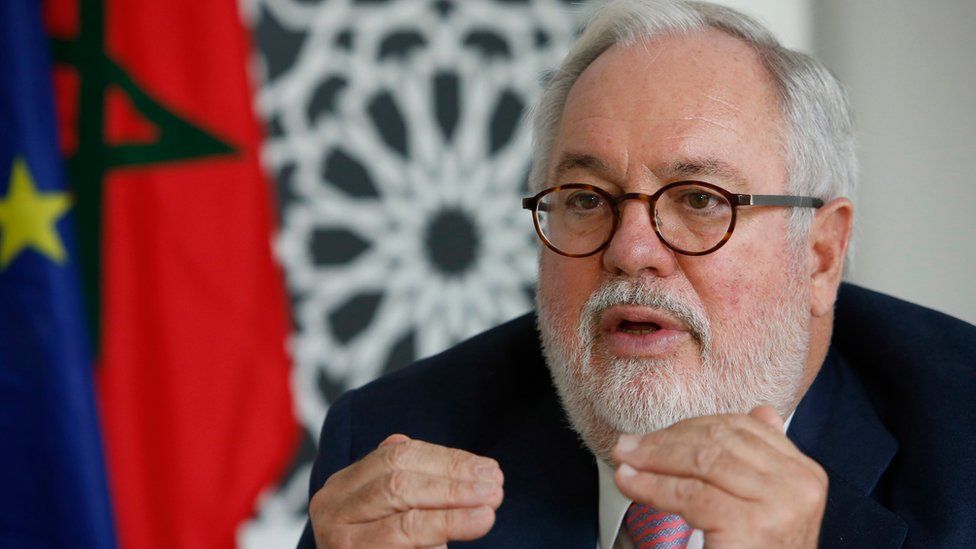EU climate chief hails global progress on emissions
- Published

Europe's climate change chief says he is astonished at the positive progress by governments towards a global deal on CO2.
Miguel Arias Cañete said it was "quite astounding" that 149 nations have published their plans to curb carbon emissions.
He told BBC News that even six months ago he would not have believed such commitments would emerge.
Nations have been announcing plans ahead of the Paris climate summit.
He warned, though, that nations' pledges had not yet reached the level needed to prevent potentially dangerous warming.
Mr Cañete said: "There are many, many reasons to be cheerful. The fact that 149 countries to date have presented the United Nations their commitments to fight global warming is astonishing.
"We have countries which together produce nearly 90% of global emissions - so that's a big effort. If we compare it with the Kyoto Protocol - the first time we tried an international agreement to help global warming - there were only 35 countries and they covered less than 14% of emissions.
"It's quite astounding. The most important things is that the commitments are not only figures or targets - it shows countries are developing climate policies in a very comprehensive way."
Top-down target
Mr Cañete said the key was that instead of a UN conference imposing top-down targets, governments were volunteering their own action plans.
"There is no complacency - but we if we had kept on going with business as usual (ever-rising carbon emissions), global temperature would have raised between 3.8 and 4.7C," he said.
"We estimate that current commitments achieve about 3C maximum. That's a big step, although clearly it's not enough."
The generally agreed maximum "safe" temperature rise is 2C - although some vulnerable nations say this is not safe for them.
Professor Jacquie McGlade, chief scientist of the UN environment programme (UNEP) told BBC News: "I am very surprised in a positive way - the normal procedure for these events has been governments brought kicking and struggling to the table.
"Now I see member states, citizens are willingly pledging for transformational change in society. It's a participatory progress so you do feel it will stick when we leave Paris (the climate conference next month)," she said.
"When countries saw the big players - the EU, the USA - put their figures on the table, there's a bit of copycat - which is a good thing.
"Some countries sent in their commitments and having seen other countries, they took them away and came back with more ambition. That tells you this is going to be a race to the top, not the bottom." Gabon was one example, she said.
Prof McGlade, based in Nairobi, said Africa was suffering the consequences of climate change already and was determined to tackle the problem itself.
"There is a sense that this is a universal problem - the 'them and us' is beginning to disappear," she told BBC News.
"Africa is becoming more and more conscious that it has to be a leader (on energy) if it wants to attract investment. You see Africa approaching this with an appetite, then you see a country like the UK not being pro-active in a way we would have recognised before."
Charles Sena Ayenu, a solar entrepreneur in Ghana taking part in the Rabat meeting, said: "There's still work to be done, but I see a lot of optimism, a lot of excitement and passion - not just from governments but from the private sector like us."
The positive comments are predicated on the expectation that nations will actually carry out their promises. They contradict the conclusions of a new report from the former UK chief energy scientist David Mackay, which asserts that the UN talks are doomed to fail because nations will do as little as possible.
Mr Cañete stressed that the current wave of commitments should be a starting point, not a finishing point. The EU wants the Paris conference to agree the need for a regular review of climate targets.
Follow Roger on Twitter.